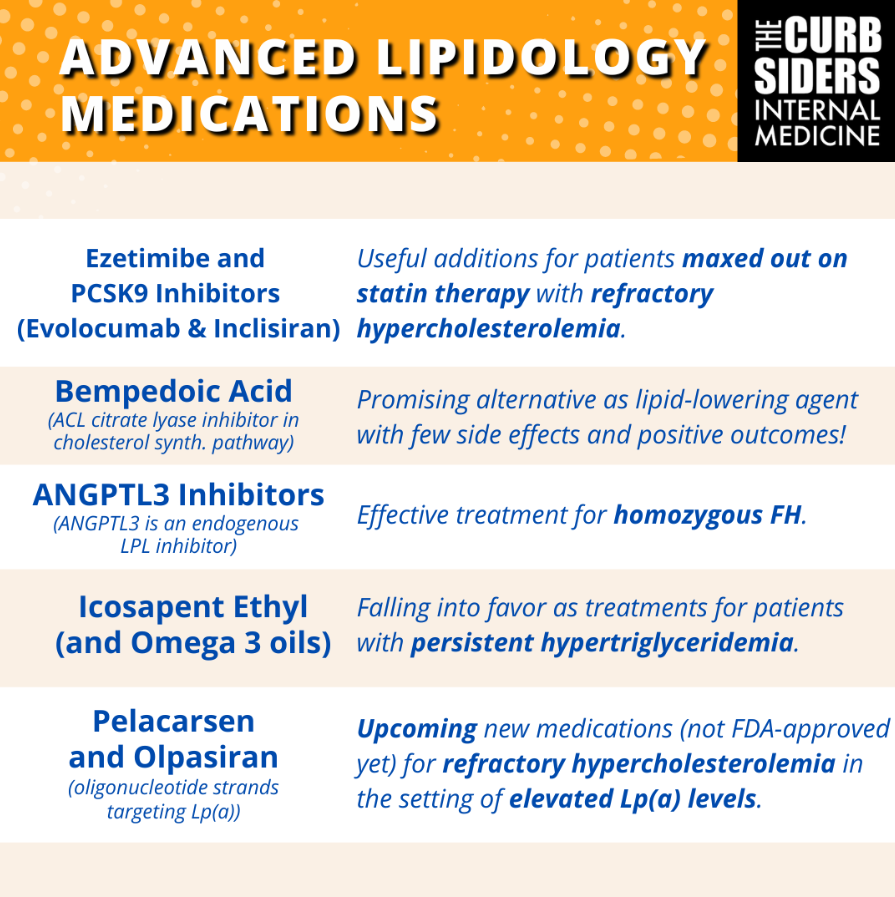One of the moderators of #361 recommends first reviewing #191 Lipids Update and Cardiovascular Risk Reduction with Erin Michos MD
JANUARY 20, 2020 By CHRIS CHIU
In this post, I link to and excerpt from The Curbsiders‘ episode #361 Advanced Lipidology, OCTOBER 24, 2022 By CHRIS CHIU*.
*Chiu CJ, Antaki J, Michos E, Williams PN, Watto MF. “Advanced Lipidology – Lipids Update 2022: Cardiovascular Risk Reduction and New Medications on the Horizon with Erin Michos, MD”. The Curbsiders Internal Medicine Podcast. https://thecurbsiders.com/episode-list Final publishing date, 2022.
All that follows is from the above resource.
Lipids Update 2022: Cardiovascular Risk Reduction and New Medications on the Horizon with Erin Michos, MD
Ready to take the next step in management of your patient with hyperlipidemia? Dr. Erin Michos (@erinmichos) returns to give us a lesson in Advanced Lipidology. She updates us on what new medications we can use for those difficult to treat lipids and what medications are on the horizon.
Advanced Lipidology Pearls
- Lifestyle changes remain the cornerstone of cardiovascular disease prevention and should never be neglected in our conversations with patients. “Primordial prevention” is key! We should start as early as possible in preventing ASCVD risk. A patient’s risk from plaque burden is not only due to the magnitude of LDL elevation but duration of exposure
- Risk-enhancers (e.g. family history, chronic inflammatory disorders, pregnancy-related adverse outcomes) should guide management for patients who are in the borderline and intermediate ASCVD risk groups
- Coronary Artery Calcium Scoring can be a very useful tool to provide more data in assisting with shared decision making, ESPECIALLY in patients who are very reluctant to start a statin. Don’t underestimate the power of a CAC score of zero.
- Biomarkers can be useful to help drive management – particularly Lp(a) for further risk-stratification. Dr. Michos’s expert opinion is to check Lp(a) levels in ALL patients at least once, particularly in those with strong family history and those with a premature history of CAD
- Antisense oligonucleotides (ASOs), such as Pelacarsen, and siRNAs, such as Olpasiran, are ground-breaking new medications that can be useful when managing patients with elevated Lp(a) levels and refractory hypercholesterolemia
- Encourage combination therapy in very high-risk patients early! Medications such as ezetimibe and PCSK9 inhibitors (evolocumab, inclisiran) can be very useful additions for patients who are maxed out on statin therapy with refractory hypercholesterolemia.
- For statin-intolerant patients, remember to always start low and go slow before transitioning to other medications.
- Novel therapies such as bempedoic acid are promising alternatives as lipid-lowering agents with few side effects and positive outcomes.
- Homozygous familial hyperlipidemia (FH) can be difficult to treat – ANGPTL3 inhibitors are becoming a mainstay of treatment for those with homozygous FH due to favorable reduction in LDL
- Icosapent Ethyl, omega 3 oils should be considered as an important treatment option for patients with persistent hypertriglyceridemia
Start here





